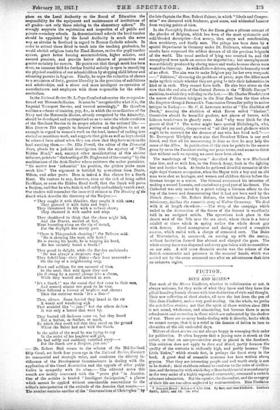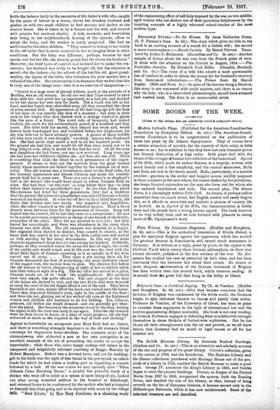FICTION.
SEEN AND HEARD.* THE work of the Misses Findlater, whether in collaboration or not, Is always welcome, for they write of what they know and they have the gift of handling homely themes with true distinction of style and thought, Their new collection of short stories, all save the last from the pen of Miss Jane Findlater, mates very good reading. On the whole, we prefer the ante-bellum stories ; not that the spirit of those written since 1914 is not sound, wholesome, and stimulating, but because there is more refreshment and recreation in those which are unhaunted by the shadow of war. There are so many books dealing with it directly, books which we cannot escape, that it is a relief in the domain of fiction to turn to chronicles of the old unclouded days.
Writers of abort stories are not always happy in arranging their order for publication. It often happens that a janing note instruek at the outset, or that an unrepresentative story is placed in the forefront. This criticism does not apply to San and Heard, partly because the quality of the contents is uniformly high, mad partly because ".The Little Tinker," wbioh stands first, is perhaps the finest story in the book. A great deal of romantic nonsense has been written about gypsies. That they are interesting people and well worth study is nob to be denied ; their stubborn refusal to conform to the rules of civilizes Lion, and the tenacity with which they adhere to this social nonconformity in the very midst of a highly organized community, command a certain reluctant admiration. But the squalor, the discomfort, and the savagery of their life are too often neglected by sentimentalists. Miss Findlater
• Sean arid Beard : Before e+d After1914. 13y Mary and Jane Findlater. Leaden t amine Elder, and CO. [Do. ad.)
bolds the balance fairly in the narrative of the tinker's wife who, caught by the pains of labour in a storm, leaves her drunken husband and pushes on with two small children to find succour and shelter at the nearest house. She is taken in by a farmer and his wife, and treated with genuine but cautious charity. A rich, eccentric, and benevolent. lady living in the neighbourhood, hearing of the episode, offers to adopt the baby, and the mother is sorely perplexed. She bad no ambitions for the other children. " They seemed to belong so inevitably to the old order that it never occurred to her to imagine them in other conditions. But the baby was different ; perhaps, because he had nearly cost her her life, she already prized him far above his brethren." Moreover, the brief taste of comfort had inclined her to make the con- cession ; her husband was ready to be bought off, but the situation is saved—for the tinkers—by the advent of the terrible old great-grand- mother, the Queen of the tribe, who terrorizes the poor mother into a refusal of the offer. Her intervention is so dramatic that we feel that this is truly one of the things seen—that it is no exercise of imagination :-
" Seated in a large creel of plaited willows, much in the attitude of a Buddha, was an old woman. So old she was that Time seemed to have done with her—had given her up apparently as a bad job, and decided to lot her choose her own date for death. Not a tooth was left in her head, and ber bands were shrivelled away till they resembled the claws of some ancient bird. All appearance of life had long ago left the flesh of her face—it was exactly like that of a mummy ; but deep in their sockets her bright blue eyes flashed with a strange vindictive gleam like the eyes of a ferret. This weird relic of humanity had indeed trodden the earth for the extraordinary period of a hundred and four years. The tribe held her sacred, they obeyed her every nod, would almost have worshipped her, and trembled before her displeasure, for rho was believed to have uncanny powers. A glance of those terrible old blue eyes could, it was thought, owerlook anyone who displeased her. She had never slept under a roof in all her hundred years. On the ground she had lain, and would lie till that time, surely net to be long delayed now, when it would be her bed for ever. Of all the sons and daughters she had borne, not one now survived. Long years ago she had seen her children's children die--yet here she was stilL 'There is something that chills the blood in such permanence of the imper- manent. It seems to shut out the survivor from the groat human family whose members are linked together by the common tie of mor- tality. This old woman was a tremendous asset to tho Reid tribe, for her uncanny appearance and almost fabulous age made the count7 people hold her in great awe. There was not a farmer's or shepherd s wife in the district who would have dared to refuse Grannie Reid an alma. She had been on the road' so long before their day—so long before their father's or grandfather's day ! At the Glen Farm, where Macpherson had lived for three generations, they had a tradition that the present Marpherson's grandfather remembered Grannie a hearty woman in his boyhood. At some far-off date in their tribal history, the Beide had divided into two bands. One migrated into Argyllshire, while the other remained in the old Perthshire haunts. Then a fierce dispute arose between them for the possession of Grannie. Long and heated was the contest, till at last they came to a compromise : she was to be a joint possession, sometimes in charge of one branoh of the family, sometimes of the other. They did not pretend to lore her ; but they feared her exceedingly, and there was abundance in the camp when Grannie was with them. The old creature was despotic to a degree. She migrated from district to district, from county to county, as the fancy took her, seated in her creel in the little caddy-cart and waited on with servility by her many descendants. In this way the made dramatic appearances from time to time among her kindred. Suddenly, perhaps, as they crouched round the camp fire late at night, the rattle of the caddy-cart would sound, and in the cart was the creel with the dread little figure of Grannie squatting in it as upright as if she were carved out of stone. • . . Then came a stir among them all, for Grannie demanded the beet of everything—the most sheltered corner of the ragged tent, the tastiest bone to pick. The children fled before the old woman in terror, disappearing at sight of her as rabbits whisk into their holes at sight of a dog. The day after her arrival in a place Grannie would set off to ' work' the neighbourhood. Her methods were very simple, but quite effective. The cart stopped at the door of the house she desired to visit, and the two Reids who were deputed to carrythe creel of the old despot lifted it out of the cart. -They never knocked at any door, simply lifted the latch and walked into the house. There they deposited Grannie's creel, right in the middle of the floor and there she sat, glinting out of her wicked old eyes at the frightened women and children who hastened to do her bidding. Tea, tobacco, potatoes, old clothes she would demand—and she generally got what- ever she asked. Her bearers in the meantime stood by the door, waiting the signal to lift the creel and carry it out again. Thus the old creature went on from house to house, in a kind of royal progress, till she had extracted as much as she required in the way of food and clothing."
Against so formidable an antagonist poor Mary Reid had no chance, and there is something strangely Impressive in the old woman's bitter contempt for degenerate house-dwellers. The romantic story of the chimneysweep who abducted a nun at her own instigation is an excellent example of the art of persuading the reader to accept the improbable ; while those who crate "happy endings will rejoice in the , Angered and delightfully infernal courtship of Maggie Malcolm by Reheat Maealpino. Robert was a devoted lover, and yet his wedding. gift to his bride was the right of free burial in the graveyard, to-collect funds for which he had taken a leading part in organizing .a concert followed by a ball. Of the war stories we may specially note " When Johnnie Came Marching Home," a painful but powerful study of a shirker who went off to enlist in a spasm of mere braggadrolo, banked out after seeing wounded soldiers in the hospital at Edinburgh, and returned home to be condemned by the mother who had attempted to dissuade him from going and to be rejected with scorn by the village Wt. "Real Estate," by Miss Mary Findlater. is a charming study
of the regenerating effect of self-help imposed by the war on two middle. aged women who are shaken out of their querulous helplessness by the inspiring example of a highly educated school-teacher of the most modern type.



































 Previous page
Previous page